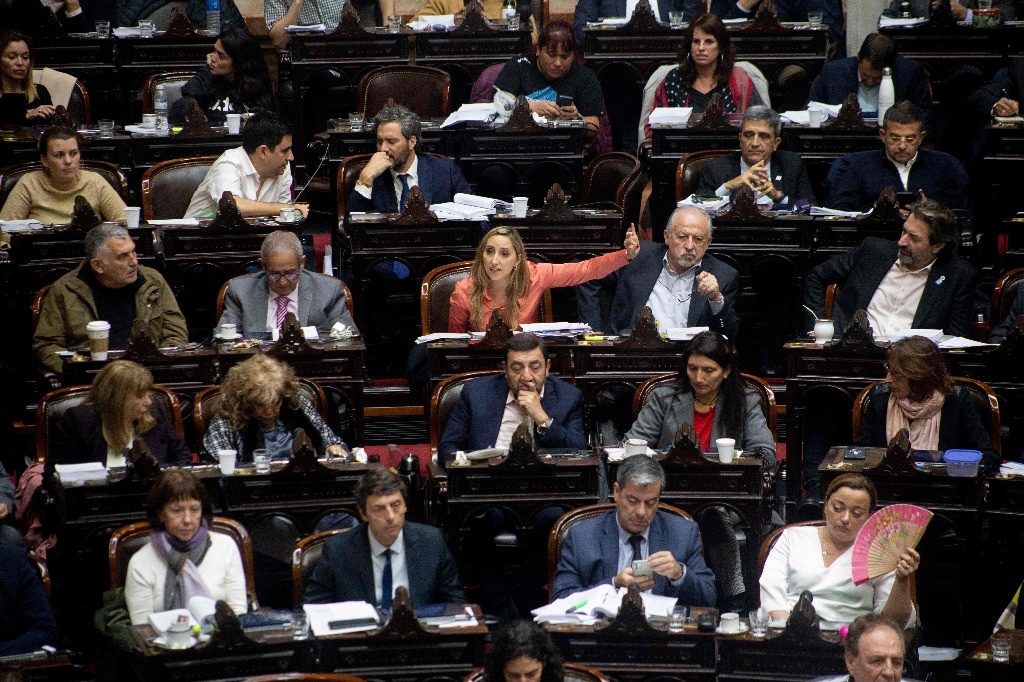Buenos Aires. The Argentine Chamber of Deputies approved on Tuesday the bill with which the government of President Javier Milei seeks to implement economic and State reforms, which was agreed upon with allied opponents to eliminate the most controversial aspects and ensure its approval.
The so-called Bases Law – the first norm that Milei aspires to achieve since he took office in December and with which he seeks to ensure greater governability – went ahead since the votes of the ruling party La Libertad Avanza were joined by those of his ally PRO and the of dialogue-oriented legislators from the Radical Civic Union, We Make a Federal Coalition, a Civic Coalition and Federal Innovation. The initiative must be discussed by the Senate in the coming days.
Lawmakers are also scheduled to rule Tuesday on a tax reform package.
Milei was pleased with the result. “This is a fundamental first step to get Argentina out of the swamp that has been the last few decades. I want to thank the enormous task of all the deputies who, understanding the historical moment, decided to accompany our project,” the president published on his account on the social network X, formerly Twitter.
While the vote progressed, left-wing organizations and parties protested in the vicinity of Congress, considering that both initiatives harm workers and benefit companies and high-income individuals.
In the Bases Law, the ruling party—at a numerical disadvantage in the Chamber of Deputies and the Senate—made concessions to allied sectors to avoid the setback that another version that contemplated major reforms suffered in the same legislative chamber a little more than two months ago. draft.
The lower house approved the articles that declare the emergency in administrative, economic, financial and energy matters for a period of one year. Also a reform of the State with the delegation and powers to the Executive over public organizations and trust funds.
On the list of organizations that are safe from attempts to dissolve by the Executive are, among others, the National Institute of Cinema and Audiovisual Arts, the National Council of Scientific and Technical Research and the National Communications Agency.
But others requested by opponents, such as the National Theater Institute, the National Endowment for the Arts and the National Genetic Data Bank, were not included in that list of exceptions.
Deputy Nicolas Massot, a government ally, pointed out that “this is no longer ‘Milei’s law’, it is the law of this Congress.” He indicated that ”there is no superpower to privatize 41 state companies without any control; We went from 16 superpowers to three limited superpowers.”
But the head of the Peronist Union for the Homeland, Germán Martínez, questioned “the abusive delegation of powers that we are giving to the president” and highlighted the “unconstitutionality” of the project.
The law also includes a labor reform, which the government tried to promote at the beginning of the administration without success and which encountered obstacles in justice. The ruling party backed down with measures that were read as a curtailment of the power of the unions, among them the one that limited the right to strike in activities considered essential and the one that eliminated the mandatory solidarity fees that workers who are not affiliated with must pay. The guilds.
The modifications that were carried out were the establishment of a trial period for workers of six months – with the possibility of extending it to eight months and a year according to certain companies -, the elimination of fines for employers for unregistered work and the establishment of a voluntary termination fund that is made up of monthly salary contributions and can replace the compensation system in the event of dismissal.
This mechanism must be established through an agreement between the business chambers and the most representative union in the sector.
In addition, it was established that participation in blockades or takeovers of establishments by workers will constitute a serious offense that could be taken as grounds for dismissal.
The deputy of the Left Front Nicolás Del Caño pointed out that this is “a counter-reform that takes away workers’ rights. It is a setback, because it brings greater precariousness.”
In Argentina more than 40% of workers are not registered.
In the chapter on privatizations, Banco Nación was excluded from the extensive initial list that the government was considering. The companies likely to pass into private hands are Aerolíneas Argentinas, Energía Argentina, Radio y Televisión Argentina, Agua y Saneamientos Argentinos, the Official Mail and the Sociedad Operadora Ferroviaria, among a few others.
The law also contemplates the creation of an incentive regime for large investments that includes a series of tax and customs benefits for national and foreign companies that invest in million-dollar projects.
Opposition deputies pointed out that “this type of concessions that harm other companies is not fair.”
#Argentine #deputies #approve #Milei #reform #project
– 2024-05-04 21:41:34
